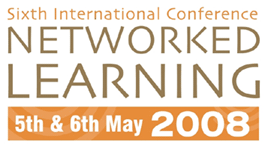

Virtual ethnography methodology for researching networked learning
Charnet, Chantal and Veyrier, Clair-Antoine
Praxiling UMR 5267 CNRS- Université Montpellier 3 chantal.charnet@univ-montp3.fr
Praxiling UMR 5267 CNRS- Université Montpellier 3 clair-antoine.veyrier@univ-montp3.fr
Abstract
This article describes the application of a qualitative method based
on digital ethnography in research on networked learning in Higher Education.
The proposed method tends towards a solution for the need of innovative
techniques for the study of new forms of interaction emerging in computer
supported collaborative learning (CSCL) and their effective uses. It is
based on three phases: first, initial exploration and systematic collection,
then, organisation and comparison of data, and finally, analysis. The
corpus is composed of various data (audio-visual recordings, images, texts):
audio-visual and textual data are organised and compared. The results
suggest that an analysis of the process in its development is possible.
The interpretative course is built thanks to the effective situations
of uses. The ethnographical methodology applied to the study of the technological
environment brings a concrete visibility of the implementation tracks
and manners. It gives the possibility of having access to the development
of the non stop process. Taking into consideration all the constituent
elements allows to encircle the diverse activities of the actor. It permits
to analyse phenomena that would be invisible with a quantitative method.
We took into account the digital specificity of the observed object. So
the following methodology joins in an ethnographical observation of sequences
of activities recorded in context of the different situations, and uses
of these devices. This frame of continuous observations requires the participation
of the researchers during the whole process. The data collection reports
the course and the integration of devices in the considered organisation.
Thus we turned to a collection of diversified data which offers the possibility
of a direct observation of situations that are in the field of the anticipation
or of the stabilized use.
The methodology of the research is articulated in three phases: first,
exploration, then systematic collection, location, organization and linkage
of the data, and finally, analysis (Crabtree 2003). The analysis does
not occur only at the end but during the whole process of research. During
the first phase of exploration, a participant observation is used and
provides the opportunity to collect data that are not easily accessible
by using other methods (Paterson 2003, p.4). Fieldnotes gives general
view of the process. But the analysis of the process is monitored through
systematic recording of the activities. Our direct observation was supported,
by recordings. We can distinguish two kinds of recordings. First of all,
the logs that the technical framework permits to collect. The institutional
logs of the virtual learning environment constitute the first source of
that kind of information. But the ethnographical methods enable to enlarge
the collection of log data: the record of the ecological context. We can
distinguish two levels of context which need different techniques of recording
of the ecology : computer screen recording and video-taping of the student
working on an activity. The data contents are then tracked down and organised
to allow the constitution of a corpus which constitutes the maximal unit
in which it will be possible to build interpretative routes. The detailed
study of the episodes shows how every stage is essential for the construction
of manners and participates in the direction given to these numeric manners.
Many of these phenomena only emerge after repeated viewing video tapes
or other data. The ethnographical methodology applied to the study of
the technological environment brings a concrete visibility of the tracks
of implementation and manners, and gives the possibility of having access
to the development of the non stop process.
| About NLC |
2008 Conference Papers
| Conference Committee| Keynote
Speakers
| Papers from previous NL conferences |Research Seminars| Current Conference
| Sponsors | Contact
|
